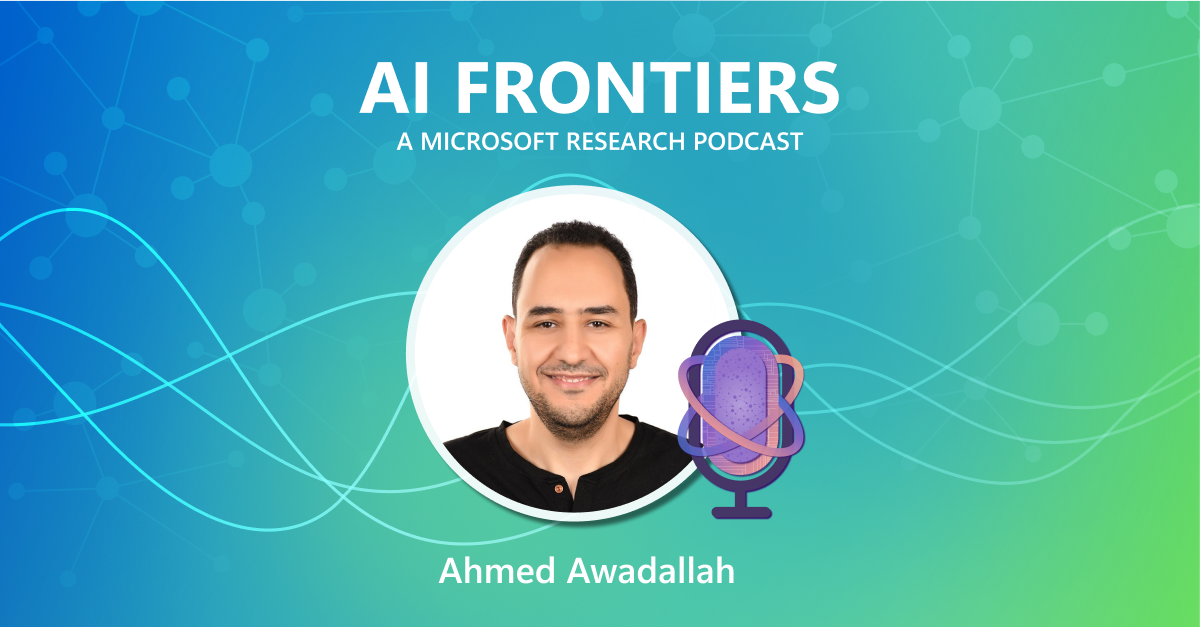Posted by
MICROSOFT RESEARCH PODCAST
AI Frontiers: The future of scale with Ahmed Awadallah and Ashley Llorens
This episode features Senior Principal Research Manager Ahmed H. Awadallah, whose work improving the efficiency of large-scale AI models and efforts to help move advancements in the space from research to practice have put him at the forefront of this new era of AI.
Martinez is a senior program manager in Microsoft Research who has worked on all kinds of projects, apps, and services (including Microsoft.com) since joining the company in 2000. His commitment to volunteering and giving back to the community has been with him his entire life, devoting his free time, skills, and energy to organizations such as UNICEF, Special Olympics, and the Lifelong AIDS Alliance.
Now, with the celebration of Computer Science Education Week, which began Dec. 9, his work and volunteer lives have converged. What he teaches is a direct extension of what he’s learned on the job and what he feels like will help empower minority students and alleviate the suffering of the disadvantaged.
“Frank is dedicated to making sure students are recognized for work done and to help all students develop their talents,” says Michael Braun, who teaches computer science at Rainier Beach. “He wants students to grow as professionals with 21st-century technology skills.”
In his own neighborhood, Martinez spends an hour every weekday except Thursday teaching a design curriculum to about 25 freshmen. His class complements an introduction to computer science course taught by other instructors at the school. On Thursdays, he’s recently begun teaching adults at the Downtown Emergency Services Center (DESC) in Seattle.
“I feel like my gifts are being used during my brief time on this planet, that they’re being put to good use,” he says. “I want to give all the gifts away by the time I die.”
He grew up in Eastern Washington with grandparents who instilled in him the value of community involvement and activism. They gave him the constant motivation to make the world a better place and to always help others. They were migrant workers from Texas who were the first in their family to own land, and they raised Concord grapes in the Yakima Valley as one of Welch’s family farmers.
Martinez was set to follow in the family’s farming footsteps until IBM recruited him in high school. In 15 years, he worked his way up from the mailroom to become an analyst, picking up technical training along the way at City University of Seattle and Renton (Wash.) Technical College, as well as at IBM. He came to Microsoft in 2000 after several years of traveling and worked on analytics for sales teams before joining Microsoft Research in 2007. He loves how he’s been able to dive into one of his great passions—the web.
“I love what the web has done to democratize society,” Martinez says. “Anybody can play in it and work in it. This is the world we want to live in. It’s easy to build for and get started. It’s age-neutral and skill-level-neutral. There’s no hierarchal structure—it’s the truest flat organization. No one owns it.”
Martinez is excited about how the web is always redefining itself, such as with social media, images, and even the ubiquitous selfie. But while technology is all around us, it doesn’t always seem accessible.

As part of Computer Science Education Week, Microsoft—in partnership with Code.org and other leading tech companies—is encouraging 10 million students to spend an hour learning basic coding skills. Lots of activities are happening, including free coding lessons at Microsoft stores that focus on Kodu Game Lab and Microsoft Research’s TouchDevelop app.
Martinez’s approach with his students at Rainier Beach is to get them past the possible intimidation factor of coding to seeing what could be done with it. His design curriculum covers basics such as the golden mean, balance, ratio, colors, fonts—as well as more advanced concepts such as storyboards, user studies, and design-collaboration beta tests.
They use TouchDevelop to take what they’ve created with pencil and paper and turn it into an online reality, such as games. Some of the students work on the app through their own phones and devices, but others use the Windows Phone devices Microsoft donated to the class.
“It’s opened their minds, eyes, and spirit,” Martinez says. “It’s lit them up.” The students are empowered by realizing they can express who they are through their creations, he says.
The same might happen for the folks he sees on Thursday mornings, who packed a computer lab on Dec. 5 for Martinez’s initial foray into teaching an Hour of Code tutorial to the clients of DESC.
Martinez started volunteering at high schools when he was in his 20s. He felt he could connect with students and relate to them through programs like MESA at Franklin High School. He’s brought a Rainier Valley influence to local TED talks, recruiting speakers such as musician and community activist Ben Hunter for the annual TEDxRainier event.
Martinez is a guy who redefines busy. But he doesn’t seem fazed. In fact, he’s smiling the whole time.
Maybe it’s the yoga he does, or maybe it’s his gentle, relaxed demeanor, but just a half-hour with Martinez and you feel like anything’s possible—so the teens and people he’s instructing every day must be picking up that energy, too.
For them, the Hour of Code isn’t a one-time event, but a constant hope for a better future.


